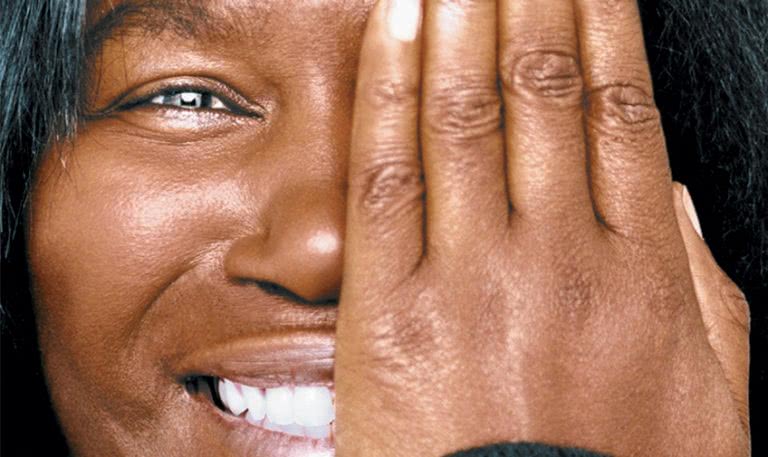Ifyou haven’t seen Joan Armatrading play live anytime during the last 42 years, it’s not been for lack of opportunity. The West Indian-born, British-raised singer and guitarist launched her career in 1972 with the recordWhatever’s For Us. Henceforth, she embarked on a run of unparalleled productivity, which still hasn’t ceased.
“I can’t give up writing. It’s what I was born to do,” she says. “It’s not even me being determined. It’s just that I like to write songs, so I write. Once you’ve written the songs, it’s nice to get people to hear it in that live situation and feel that atmosphere.”
Armatrading’s compulsive creative bent has resulted in a total of 20 studio albums, the most recent being 2013’s Starlight. Despite averaging one record every two years for 42 years, she’s rarely been absent from the touring circuit. This level of activity might sound utterly exhausting, but Armatrading has never given much thought to reducing her workload.
“I’ve always been in charge of my musical career,” she says. “When I toured, I toured because I enjoyed what I was doing. I don’t need somebody to tell me to tour. I know my capabilities, I know what I enjoy and I know what my stamina is.”
Even if it’s been Armatrading controlling her own destiny for all these years, it’s worth noting that the non-stop application to her vocation is largely unrivalled. She points out that the day-to-day workload of other music industry lifers doesn’t quite match up.
“People say, ‘OK, Tony Bennett’s still on the road, B.B. King is still on the road,’ but they’re not on the road in the way that I am. They’re on the road, they do a couple of shows then take a huge amount of time off and then do another show.
“My tours are very long. They’re a year to 18 months; a short tour is six months. There’s not huge breaks. When it’s going on for 18 months, it goes on for 18 months.”
However, for music fans who are yet to witness the Joan Armatrading live experience, opportunities to do so will soon diminish significantly. After a celebrated appearance at 2013’s Bluesfest, Armatrading returns to Australia later this year for a run of intimate theatre shows. These shows are part of the singer’s Last Major World Tour.
“I’m 63 now, I’ll be 64 at the end of the year,” she explains. “If I did it in the pattern I have – which is tour, record, tour – it would mean that by the time I did the next tour I’d be 67. I don’t want to be on the road in that way all this time and think, ‘Why am I on the road now? I don’t like this, I’m tired.’ I want to enjoy it all the time.”
Before panic sets in and flights are booked to the UK in order attend the final shows of the Last Major World Tour next March, Armatrading clarifies that this won’t be her final tour ever. She’s hardly the sort of person who’d give up the ghost.
“The tours will be shorter,” she explains. “It doesn’t mean I won’t ever come to Australia. It just means I won’t do as many shows.
“I’ve always been enthusiastic,” she adds. “That’s exactly why I’m doing what I’m doing now, which is the last major tour that I know I enjoy still. I don’t want to get to a stage where, having done it in this fashion, I don’t want to do that the next time.”
Back in the 1970s, Armatrading’s nascent releases – which gained helpful support from legendary BBC radio DJ John Peel – featured an acoustic folk sound and immediately highlighted her idiosyncratic guitar playing. This early work justifies comparisons to the likes of Joni Mitchell and Jackson Browne, but Armatrading didn’t keep walking that stylistic avenue for long.
In fact, flicking through Armatrading’s greatest hits, it’s almost like listening to a ‘various artists’ compilation. Folk became folk-pop, which developed into more commercially slanted pop-rock. Then there have been forays into straight-ahead rock and a recurring embrace of blues and jazz.
Armatrading hasn’t constantly shifted genres with hopes of reeling in big money, using whatever bait necessary. Rather, it’s simply been a result of her unfettered artistic perspective.
“I just do what I want,” she says calmly. “I’m an eclectic writer, so I like to write different things. The record company’s never said to me, ‘Joan, it’s time to make a record.’ It’s always been me saying, ‘OK, here’s my record.’ Because the record company wouldn’t know what I was doing, they wouldn’t be able to say, ‘Well you can’t do that, because last time you did this.’ They just kind of got what they got.”
Having that level of artistic autonomy is mighty unusual. Even though Armatrading has always safeguarded herself against record company demands, her stylistic changeability could easily have scared off listeners. But it’s unlikely that we’d still be talking about her today if she hadn’t secured a loving fan base.
“I’m lucky with my fans,” she says. “Without the fans, there’s no way I would have a 42-year career. My fans obviously enjoyed what I was doing as well and enjoyed the different changes that they were getting. So they played a big part in this long career that I’ve had.”
Catch Joan Armatrading at Enmore TheatreonWednesday December 10, tickets online.

































